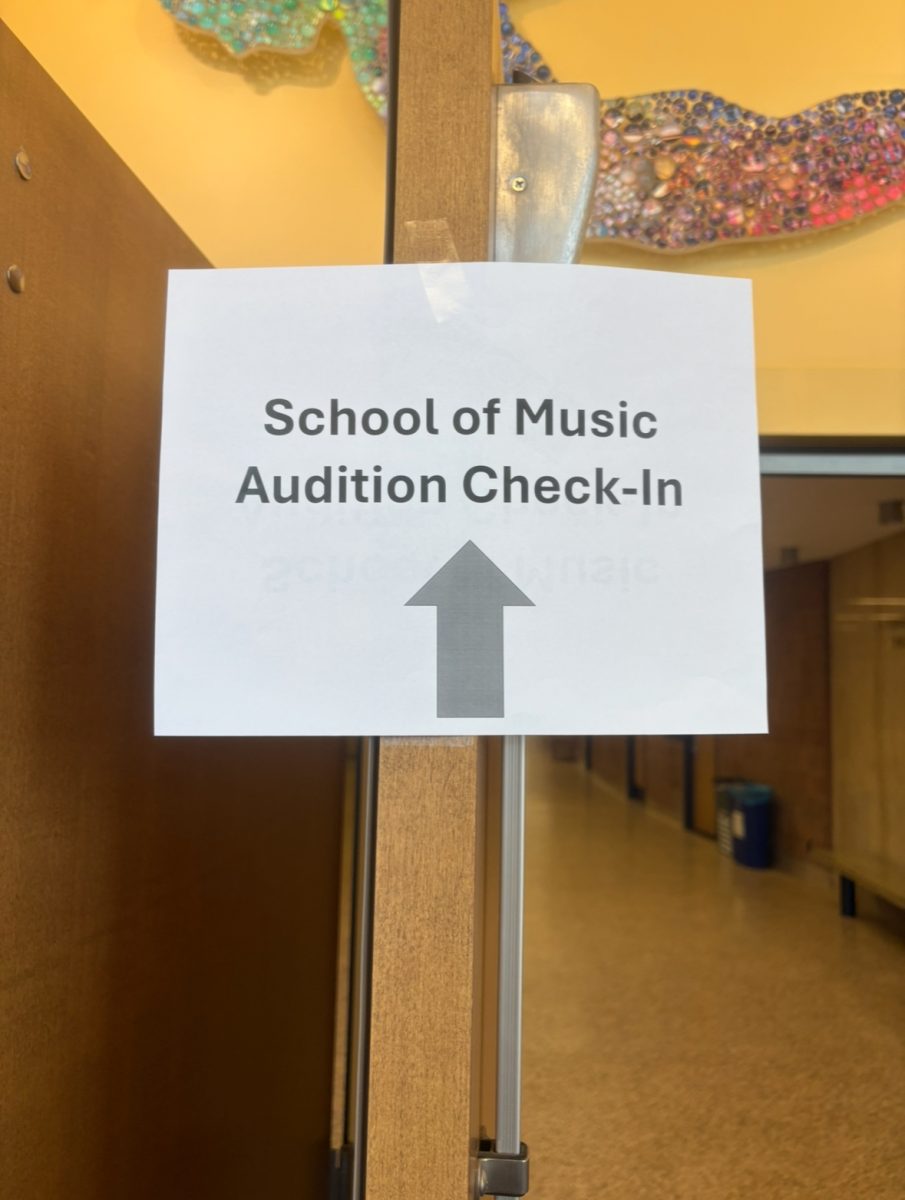Twenty-three anxious students approached the Center for the Performing Arts on a Saturday in early April, and whether they needed to go over song lyrics, assemble their instrument or prepare for their faculty interview, everyone questioned whether Kent State was the right fit for them.
The School of Music has hosted three audition days this semester in February, March and April and has collected over 100 prospective students for the fall 2025 semester. While the high intensity of auditions like these may be exaggerated on television, Kent State’s music staff said they want to assure students this process should feel collaborative and stress-free.
Students are evaluated on the basics like scales and sight singing, but they mainly look at a potential student’s flexibility, passion and willingness to be taught, Sarah Labovitz, the director of the School of Music, said. Music education is the most popular major students audition for.
“You’re coming to school to study music, so we expect that you are going to be curious about learning and about getting better at your craft, and so the audition is sometimes more like a mini-lesson than what people would think of as an audition,” Labovitz said. “Because we want to get to know the prospective student as a person in addition to as a musician.”
As well as the 20-minute audition slot each student gets, potential music education majors must attend an interview with a staff member “to make sure that the students are in a great place to be a future teacher,” Labovitz said, furthering the sense of closeness that the school fosters among staff and students.
Her personal experience growing up in a family of “not-musicians” where she didn’t start private lessons until her junior year of high school allowed Labovitz to see herself in a lot of prospective students’ passion and eagerness to find a starting point.
Andrew Rothhaar, a sophomore music education major, has been assisting with audition days since his freshman year. His involvement in the School of Music extends to its many extracurricular activities including wind ensemble, chorale and vocal jazz ensemble, and he echoes the belief that connection between staff and students is essential to a smooth audition.
“Whenever I auditioned, the faculty that I did my audition with were asking me a lot more questions than other schools, and they were questions about me, they weren’t questions about my music knowledge,” Rothhaar said. “It felt refreshing because every other audition I had kind of felt robotic. It felt like there was a wall between the professors and I, so it gave me the assumption that it’s a lot more family and community than it is a school of music.”
Rey Lifford, a junior double major in music performance and music education with a minor in digital media production, also dedicated their Saturday to help with auditions. Students auditioning this semester should try to view their audition as a private lesson, Lifford said.
“Don’t be afraid to make mistakes,” they said. “If you think that you’re being so uptight being like, ‘I can’t make a mistake,’ you’re going to make mistakes. So just allow yourself to make those mistakes and kind of treat it as if it’s like a lesson, and you’re going to go back and you’re going to fix that mistake.”
The music education program specifically always encourages students to start teaching as early as they can, Rothhaar said.
“Freshman year there was a day that one of the ensemble directors wasn’t there and one of the other seniors who was normally running the rehearsal wasn’t there, and I was asked to do it,” Rothhaar said. “And I was a freshman, and I had no idea what I was doing, but it gave me that experience that you wouldn’t get, for example, at Ohio State … I’ve hosted a couple of sectionals for the top voice ensemble leader, and I have learned so much from it.”
Kent State is also an “access institution,” meaning it prioritizes giving everyone a well-rounded education both in music and any other other subjects of interest, unlike a conservatory with stricter regulations about what students can and can’t focus on.
Many music-centered extracurriculars like the a capella group are open to all majors, and School of Music students are required to take Kent core classes and can even add minors from other colleges.
“I like to think of Kent State as a place where someone who has goals in music can come and study without necessarily having made music their entire life,” Labovitz said. “And if you haven’t devoted your life to it since you could hold a violin, we still can help you reach that goal because not everybody can afford to take the private lessons for as long as it takes and to devote their entirety of their young adult life and their youth to the study of music.”
Students of any class standing or major who want to get involved with the School of Music can visit its website for more information about future auditions, ensembles and other programs.
Olivia Weber is a reporter. Contact her at [email protected].


